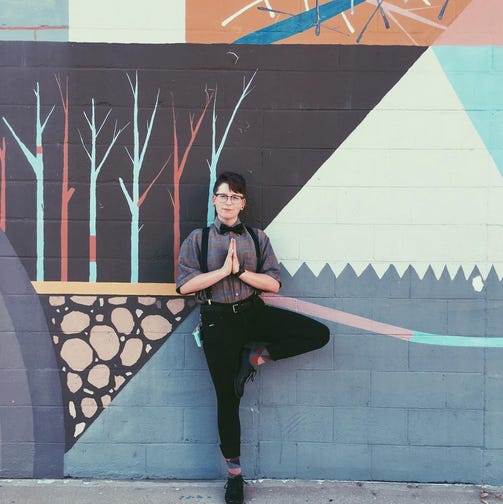“I wonder if he knows that moment will stay with me for the rest of my life.”
Pronouns: E/Em/Eirs
Michi spent a lot of eir time shifting between opposite lifestyles and homes in eir childhood years. E said in some parts of eir life e were surrounded by out, queer kids.
“But because of the instability of my home life and my family’s ties still to the conservative lifestyle when we were in more conservative areas, I never had the space to come out until after I left home,” Michi said.
Eir coming out journey has taken several paths as e figured out eir gender and sexuality at different times. E explained that though each experience was separate, they influenced each other. The first time Michi identified with the LGBTQ community was when e got eir first girlfriend at 21 years old.
But understanding eir sexuality was difficult for quite some time, e said, as e were on the asexual spectrum. Michi also said eir mother raised em under an ideology where “having a man is my highest worth,” which led to some abusive relationships “because being alone was worse.”
“Looking back, I know I was always in love with my best friend but didn’t know that is what that feeling was,” e said. “A pivotal moment for me [with] my sexuality was in my senior year of high school health class; a friend and I were passing notes and he asked me if he could share a secret with me and he told me he was bisexual.”
This is the first time e had ever come out to anybody.
“It did feel good to tell someone,” Michi said. “It was freeing.”
“I hadn’t even consciously admitted it to myself yet but without thinking I replied, ‘me too,’” Michi explained. “There are moments I wonder if he knows that and if he knows that moment will stay with me for the rest of my life.”
E also met a nonbinary person for the first time when e were 23 years old, and “it suddenly clicked.
“My gender has always been something of an ‘I don’t feel like a boy so I must be some sort of weird girl,’” Michi explained. “It’s amazing how when we have language, being able to self identify and know who we are as individuals alters our understanding of ourselves and how we relate to others.”
This person was the same one Michi first came out to as nonbinary, just a couple years after learning the term and watching them grow as a person.
“It was very supportive of a moment but coming out about my gender and expressing my will to medically and socially transition was some of the hardest conversations I have ever had,” Michi said. “Since my first coming out it has been mostly hardship after hardship.”
Michi explained that there is no “passing” for a nonbinary person, and that there is no space to have a voice and be recognized by society. One of the largest hardships e have had to overcome is living in Texas as a queer disabled person.
“Finding a job is 10 times harder since I came out and became disabled. As someone that strives for education and loves working in the medical field, disclosing my pronouns is one of the first things that make employers uncomfortable and therefore see hiring me as more of a hassle versus something to add,” e said.
And in addition to this, eir relationship with family has since become absent after coming out.
“My relationship with my family now is nonexistent for they were not supportive of my first of many coming outs with my sexuality, so many aren’t even aware of my trans identity,” Michi said. “I have an identical twin sister that was my best friend growing up but as I move more into my queer identity, our relationship has changed in ways where we struggle to understand each other.”
And with any friends e had growing up, they came out as queer long after they stopped being friends.
However, eir name was gifted to em by a friend when e were just 15 years old.
“It means kitty and being a gender neutral name, it has been my name since even before I came out,” Michi said.
And e chose eir pronouns because they/them “never seemed to fit me as well as I would have liked to think,” e said. “It took me until I learned what nonbinary was to come out because binary he/him pronouns sounded just as weird and wrong as she/her since I am not very masculine of a person.”
Michi also said eir personality has evolved since e first self-identified as LGBTQ, enough to joke that e’ve made eir way “across all the letters in the alphabet mafia,” and e believes eir identity will continue to shift.
“There is no one advice that fits all because everyone’s experiences are so unique. I have assisted hundreds of individuals coming out and no one’s journey is the same. I also say, safety first! Get yourself in a space where you are safe, find community of people that support you and make some friends with some other queer individuals. We have an ability to support each other in ways people outside the community don’t understand.”





